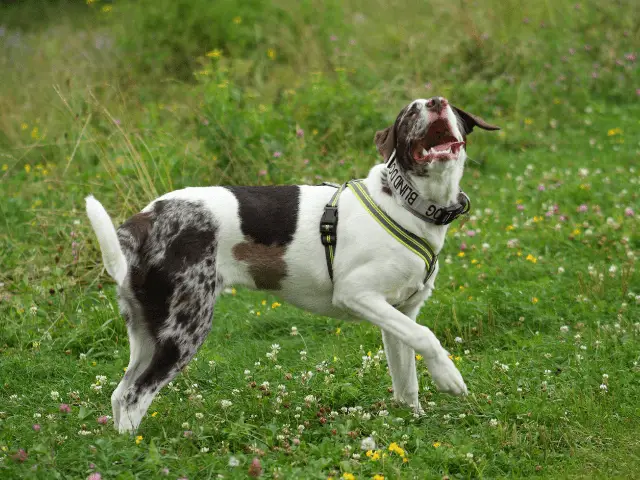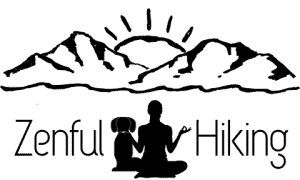In 2019, we noticed a change in our mixed-terrier dog, Tessa. Normally, she would bound up the stairs at bedtime with the same unbridled enthusiasm that she applied to all of life’s activities.
All of a sudden, she began to go up the stairs much more slowly than usual, her demeanor that of an elderly dog, or a dog in some kind of pain.
After a few days of this, I took her to the vet. At first both the doctor and I thought she might be having some arthritis in her back, although this would have been unusual for a dog who was only seven years old.
One day, about three weeks later, she ran straight into an armchair en route to the yard for her morning pee.
Sudden Acquired Retinal Degeneration Syndrome
Once outside, she ran into the fence at the back. Now our visit to the vet, followed by a trip to an animal ophthalmologist, confirmed that Tessa was going blind. She was ultimately diagnosed with SARDS, or Sudden Acquired Retinal Degeneration Syndrome.
This relatively rare condition is not curable or treatable—although fortunately not life threatening. Within a month, she could hardly see at all, although still able to perceive some high contrast things, such as the dark grey garbage can that someone had left in the middle of the sidewalk.
Not long after that it was clear that she was completely blind, no longer even able to follow the side to side motion of a bright flashlight we shone directly in front of her face.
Adjusting to Being Blind

After an initial grieving process (mostly on our part, to be honest), there were so many adjustments to make, so many new things to learn about canine blindness , that the loss of hiking with my dog was the last thing on my mind.
, that the loss of hiking with my dog was the last thing on my mind.
But adjustment and6 learning did happen, and to a surprising degree.
Yes, she is a more cautious animal than she was.
She doesn’t do her headlong “laps,“ as we would jokingly call them, in big circles around the yard anymore (we’ve always joked that she must have a smidgeon of greyhound blood in there somewhere). But I would venture to say that at this point she has no memory of having had sight.
After all, one of the reasons that humans love dogs so much is because they live so entirely in the moment. Most people, when they meet Tessa for the first time, do not know that she is blind. Because she was not born blind, she still “looks” at people who are speaking to her.
The summer after this happened, I began to experiment with hiking with her again and was happily surprised at how easy it was.
Because sight is actually the weakest of a dog’s five senses, walking into the woods or on a beach, was a “feast” for Tessa. The smells and sounds of the terrain were an exciting change for her after the familiarity of home and our neighborhood.
Tips For Hiking With a Blind Dog
Here are some helpful tips that I learned about hiking with my blind dog:
- Before introducing hiking into your dog’s life again, make sure they learn a few simple commands.These are helpful for life in general with your blind dog—not just hiking. For managing stairs and changes in terrain, Tessa learned “step” for descents, and “up” for rises. We also taught her “jump” for slightly higher steps down (but for extreme jumps we do assist her).
She also learned “be careful,” when we want her to proceed with caution and “stop” for anything potentially dangerous.
- Start small. Go on a few very short hikes and choose terrain that isn’t challenging. Consider going on the same hike a few times in order to get your hiking hustle in gear!
- Keep your dog on leash at first—and always keep her on leash if the path is extremely narrow or there are any drop-offs along the edge.We were surprised, though, at how quickly our dog learned to stay on course. She is usually able to tell when she is about to veer off the path by the change in texture of the terrain.
Hiking on the beach has been an especially wonderful treat for Tessa. The wide-open space of the sand and shallow water has allowed her to actually run free again.
- Many dogs, once they become blind, tend to walk with their noses close to the ground.Using their noses to both smell and feel, they are often able to identify things like trees and rocks and avoid walking into them. We tried to introduce Tessa to the “muffin-top,” a type of harness with a wire bubble-shape arc that acts as a sort of antennae to detect objects in her path before she runs right into them.
Tessa was terrified of this contraption and could never get used to it, but some dogs do very well with it.
- Consider tying a “jingle” bell to your ankle. This really helps the dog to know where you are and keeps them from straying too far away.
- More extreme hikes on rough terrain or rock scrambles are not generally advised.Your blind pup may not be able to manage this safely, although each dog is different.
- Avoid surprising your dog.We’ve learned to warn our dog before suddenly petting her or picking her up. “Hi Tessa,” we’ll say so that she knows what to expect.
If you will be hiking in places where a lot of other people are around, you may want to buy one of the harnesses made for blind dogs that say, “Blind Dog,” or “Please Don’t Pet Me,” or whatever you think is appropriate.
Consider your dog’s health and age in making hiking decisions. A dog that is born blind won’t need near as much time to get used to hiking, whereas a dog that has old-age related blindness may need a gentle introduction—and gentle hikes.
Final Thoughts
My final words of advice: your dog is capable of much more than you know!
Although it isn’t easy, let your dog learn the hard way sometimes. Similarly to parenting a human child, babying your dog may not be what’s best for him.
Yes, he will likely run into some trees or bushes at first, but we promise that he will learn to manage the world without sight, and you will be able to hike together once again.

